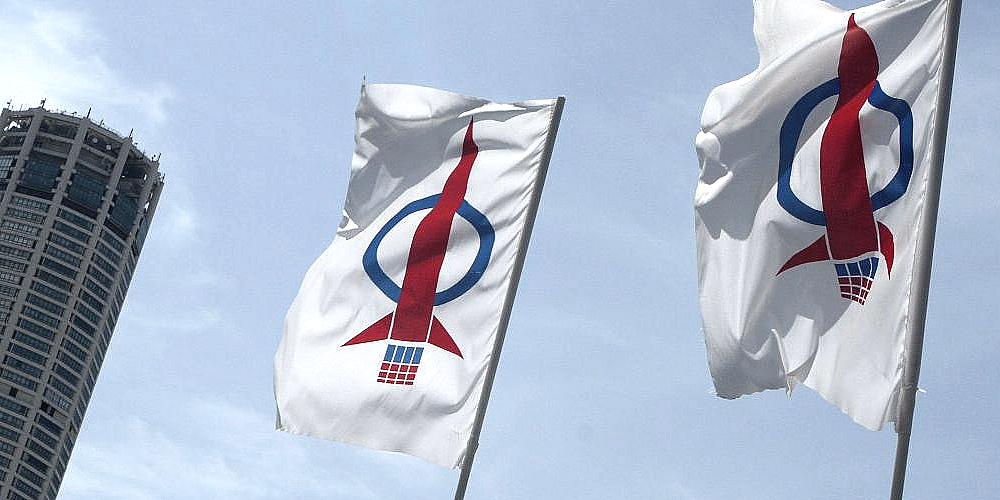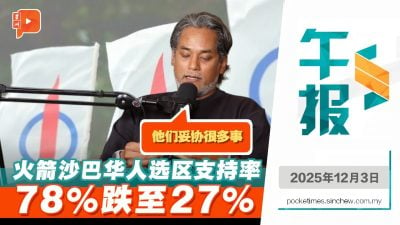
When Lim Kit Siang decided to accept the “Tan Sri” title–unlike his late comrade Chen Man Hin who until he drew his last breath had refused any honorific title–there were heated discussions within DAP, although few would dare to protest or be justified to do so, as Uncle Lim had already retired from politics by then.
For so many years DAP has been tagged with the highly corrosive “anti-Malay” label for decades, and the fact that Lim Kit Siang is the first ever “Tan Sri” the party has produced since its founding does carry some positive significance.
Even the response from the local Malay community has been varied. The well-intentioned would say this shows DAP respects the country’s constitutional monarchy and that the party is accepted by the royalty. As for the ill-intentioned, up to them, no point repeating what they say here!
The conferment of DAP leaders has once again hit the streets, this time from Sabah. The party’s sec-gen Anthony Loke has put it forthright that the fate of the two new Datuks will be decided by the party’s central executive committee.
Their fate is yet to be known at this moment, but in the party’s recent Negeri Sembilan convention, Loke once again reminded his party comrades to stick to the principle that they can only accept honorific titles after their retirement.
Looking back, it was the highly respected late party chairman Karpal Singh who first set the “edict” at a time when DAP was still in opposition and conferment of honorific titles by the royal institution basically had nothing to do with the party, hence the “lofty” posture. But this started to change when the party had the first taste of power in 2008.
Karpal Singh was unbending in his principle, and anyone accepting royal conferment could hardly escape censure. But put this whole thing in today’s context, Karpal Singh could just be wrong, Teng Chang Khim being a good example.
Unlike others who have been adamant to add an honorific title to their names having just been appointed to cabinet posts, Teng was conferred Datukship only after nearly three years in office. He never asked for it, but in the eyes of the Selangor Sultan, his exemplary performance must be handsomely rewarded.
Himself aside, the conferment also marked a definitive recognition for his party from the royal institution that shouldn’t be withheld until after Teng’s retirement.
As a matter of fact, Karpal Singh is no longer around today, and DAP has been twice part of the federal administration. It’s time to put the past behind and look forward. There’s no need of holding onto some old strategies or so-called principles. For example, the party used to enjoy some success battering its archrival MCA with the “anti-songkok” narrative, but does that still hold today?
Twice part of the federal administration, DAP should put the past behind it and look forward.
Rejection of royal conferment makes an excellent stage topic for a party which has never once helmed the government, and this will spontaneously resonate with and win thunderous applause from the audience.
That looks absolutely down-to-earth, but after all the thrills and excitement, perhaps we should think over it calmly whether this should make a major issue pertaining to the bread-and-butter of Malaysians? Does accepting royal conferment while still holding a government office constitute an unforgivable sin?
The DAP leadership needs to know that even though some of the leaders may not have been honored with any title, the aura emanating from their noble characters and stature outshines any honor and title. Others, while basking in the augmentation of honorifics and titles, their ill behaviors have given the titles a bad name. Sure enough there are plenty who truly deserve their awards.
Now that DAP is already the biggest ruling party in the government, it should deliver itself out of the rigid pledges it made while still in opposition, given that Malaysia’s royal conferment system has had a close-knit relationship with the country’s political system ever since the dawn of nationhood.
As a matter of fact, elected reps are all enjoying great remunerations and generous perks even past their retirement, which are their most basic entitlements. And if they happen to be in the government, lucrative public offices could be a big prize, with honorifics the additional bonus that collectively make up a full package for successful politicking. They don’t actually need to feel sorry for anyone!
Meanwhile, the conferment is never a potent “weapon” for political leaders to capture the hearts of his constituents. We are much more concerned about whether a leader has dutifully served the people and nation and prioritize their needs. What we abhor is corruption and incompetence, including the detestable government U-turn over the Lynas issue. This is where the Unity Government needs to work very much harder.
It is up to individuals to assess whether DAP reps should accept the titles awarded by the royal institution while they are still in office. What I would like to say is that no single political party will stay in power forever. If they do not seize the opportunity to reward their faithful members, patrons and deserving social workers while they have the right to make recommendations now, they may regret some day when they are no longer in power!
As for the principle for conferment, perhaps DAP can be spared from the embarrassment and headache if the party is willing to fine-tune its strategy.
Firstly, let the recipients decide on their own accord whether to accept or decline an offer of conferment. They should avoid recommending themselves as far as possible, but should be allowed to decide whether they should accept a title offered by the royalty or other states. Malaysians will know whether they deserve the title or not.
Secondly, while priority should be given to recommending retired leaders from the same party, deserving retired leaders from rival factions or parties must not be squarely excluded.
Politicians aside, from my years of journalistic experience, I could tell that the absence of any honorific title will not affect how much a person is respected by his peers.
For instance, the late Tan Khai Hee was always arranged to be seated with Tan Sri and other VVIPs in every event that he attended.
Some other people, such as Robert Kuok, always outshine the rest in a star-studded line-up of dignitaries in any event.
I personally feel that retired world-class athletes should be the ones awarded only after they have bowed out of sports arena. When Lee Chong Wei and Nicol David were awarded Datukship, he was only 25 and she was 24, yet to reach the prime of their respective careers!
ADVERTISEMENT
ADVERTISEMENT








































